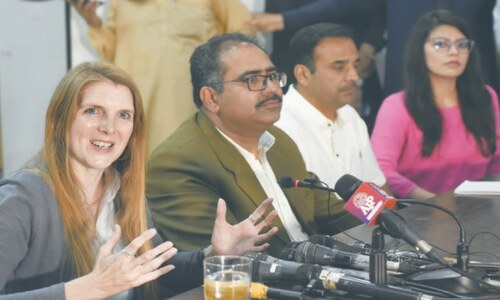ISLAMABAD: After a controversy that there were no pertinent questions about disabilities in the questioner of the census 2017, the World Health Organisation (WHO) and the Ministry of National Health Services (NHS) have decided to carry out a national need-based assessment survey on assistive technology.
During the survey, which will start after Ramazan and complete in two months, it will be assessed how many people need assistive devices.
Though according to estimates of the WHO, there are 30 million people with disabilities in Pakistan, the government has not confirmed their number.
WHO and health ministry want to ascertain what kind of assistive devices people with disabilities need
Director General Ministry of NHS Dr Asad Hafeez told Dawn that there were limitations in the census as its major focus was on the number of people rather than persons with disabilities.
“So it has been decided that a national survey will be held in which there will be a detailed questioner to assess how many people with disabilities are in the country and what kind of assistive devices they need.”
He expressed the hope that the World Health Assembly would pass a resolution in the current month to ensure that every person living with a disability got the assistive technology.
“The survey will help us in planning and policy making as Pakistan is the leading country in the region and has been pushing the international community to ensure access to assistive technology.”
About the assistive technology, Dr Hafeez said three decades ago the world had moved to make a list of essential medicines and as a result now access to essential or life-saving drugs has been ensured across the globe.
Similarly, the world is now moving towards making assistive technology accessible to every person.
A list of 50 assistive devices has been prepared and hopefully it will be available in Pakistan soon, he added.
Recently, the first Eastern Mediterranean regional consultative meeting on improving access to assistive technology hosted by the government of Pakistan concluded with a consensus that access to assistive devices would be ensured for every disabled person.
The aim of the meeting was to develop a regional framework on improving access to assistive technology.
The meeting was attended by delegations from 16 countries, UN agencies besides participants from the private sector. WHO technical advisor Dr Maryam Mallick told Dawn that not only a large number of people were born with disabilities but old age related disabilities were also increasing as the average life expectancy was continuously increasing because of better health facilities.
“By 2050 there will be two billion aged people across the globe and it will be for the first time that they will outnumber the youth. On the other hand, disabilities related to diabetes, hypertension and other diseases will increase. So it will be the responsibility of states to provide them assistive technology.”
In Pakistan, she said, wheelchair was considered the basic assistive device for disabled persons but it was not made according to the size and requirement of every person.
“However, now countries have decided that access to assistive technology will be ensured for people with disabilities. Pakistan is the pioneer country in the region which is making efforts to ensure the availability of devices by including it in the Prime Minister’s National Health Programme,” Dr Mallick said.
WHO global champion
President Mamnoon Hussain on Friday officially nominated Dr Sana Hafeez as the WHO Global Champion on Assistive Technology.
Dr Sana was disabled while she was a medical student. But she not only completed her MBBS but also did specialisation in radiology.
It is estimated that 15pc of the world population live with some form of disability. In WHO’s Eastern Mediterranean Region, comprising 21 countries including Pakistan, about 3.2pc of the population are reported to be living with disabilities.
However, this figure is likely underestimated, according to the WHO.
Assistive devices and technologies are those whose primary purpose is to maintain or improve an individual’s functioning and independence to facilitate participation and to enhance overall wellbeing.
They can also help prevent impairments and secondary health conditions.
Examples of assistive devices and technologies include wheelchairs, prostheses, hearings aids, visual aids and specialised computer software and hardware that increase mobility, hearing, vision or communication capacities.
Published in Dawn, May 13th, 2018













































Dear visitor, the comments section is undergoing an overhaul and will return soon.